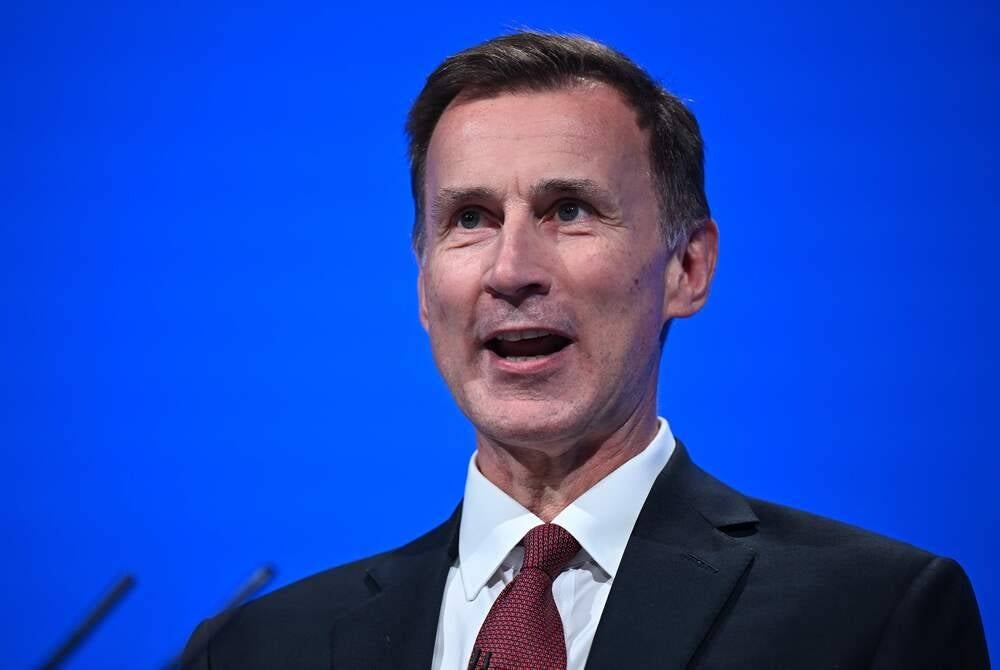UK finance minister announces boost for lowest earners

MANCHESTER - The UK minimum wage will go up next year, finance minister Jeremy Hunt said Monday, as the ruling Conservative party positions itself to battle an expected general election.
The rise from £10.42 ($12.63) an hour to £11 for over-23s from April next year comes against a backdrop of the worst cost-of-living crisis in a generation, and with the government battling to bring down stubbornly high inflation.
Industrial unrest is also rife, with hospital doctors on a 72-hour stoppage this week, in protest at sustained below-inflation pay rises even as energy and household bills increase.
The Conservatives, in power since 2010, are holding what could be their last annual conference before the next general election, with the main opposition Labour party leading in opinion polls.
Hunt, the Chancellor of the Exchequer, told party members in a speech in Manchester, northwest England, that the Low Pay Commission had yet to make its recommendations about minimum rates of pay for next year.
But he added: "I can confirm that whatever that recommendation, we will increase the National Living Wage to at least £11 per hour." Hunt and Prime Minister Rishi Sunak are under mounting pressure from Tories to cut taxes before the election, but he instead called for prudent management of the nation's battered finances.
He insisted there was "no quick fix" to the country's economic difficulties, which have been blamed on the disastrous short-lived tenure of Liz Truss last year, when she announced tax cuts unfinanced by the budget, spooking investors.
Hunt sought to reassure grassroots members worried that the parlous state of the economy could hamper voter support at the next year, insisting that "the plan is working".
Inflation has fallen from a 41-year peak of 11.1 per cent in October 2022 to 6.7 per cent in August, according to official data.
Instead of tax cuts, Hunt outlined plans to cut the size of the civil service, freezing recruitment to make savings of £1 billion a year.
Increasing public-sector productivity growth by just 0.5 per cent could stabilise soaring public spending as a proportion of GDP, he added.
But in a sign he has to overcome widespread opposition to his long-term plans, Truss addressed a packed fringe meeting of activists, urging the government to slash business taxes and cut red tape.
This year's party conference season has politicians of all stripes setting out their stalls to voters before the expected nationwide vote next year.
Hunt's call for patience on tax cuts, however, does not close the door on a crowd-pleasing announcement next year.
"We're being honest with people, there is no shortcut to tax cuts," he told the GB News television channel, which is supportive of government policy and employs several Tory MPs as presenters.
"If I gave a big tax cut this year, it would be inflationary, because we'd be putting money in people's pockets, which would boost up demand, which would ultimately mean prices would go up as well.
"So this is not the right time." Hunt's announcements, which also include plans to cut unemployment benefit for those not actively seeking work, come with a government strategy shift intended to put clear water between them and Labour.
Sunak has announced a major reset to green policies aimed at achieving net-zero carbon emissions by 2050, seen as a populist measure to win over voters.
The new strategy includes pushing back a ban on the sale of new petrol and diesel cars from 2030 to 2035, to ease pressure on motorists and homeowners.
But they have drawn criticism from opposition lawmakers, environmental campaigners and the car industry.
There will likely be more criticism to come if reports are confirmed that they are to scrap plans for a new high-speed rail link between Birmingham and Manchester.
The government, however, insisted the claims were "incorrect", with a spokesman saying that "No final decisions have been taken." - AFP










